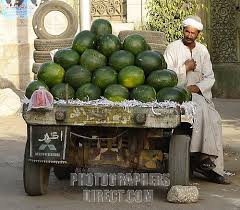Watermelon’s Summer Tales
Mark Twain once said, “When one has tasted watermelon he knows what the angels eat.” And most likely that angel was an Egyptian. Egyptians were the first to discover watermelons 5000 years ago and then shared them with the rest of civilization in the 10th century. When it comes to eating watermelons, there are many cultural rituals on how watermelons are consumed. The Japanese will elegantly decorate them and give them as gifts. In other part of Asia, people will pickle watermelons – a culinary violation that is very hard for Egyptians to swallow. Egyptians may pickle their Pharos, but watermelons are higher in their food chain. Egyptians consider watermelon a live food, which should be cut and eaten fresh, no watermelon canned, or jams. I know that for most Americans it has been customary and almost patriotic act to eat watermelon during 4th of July picnic, but before Al Sisi takeover the color of patriotic banners, some speculate that the color of the Egyptian national flag was inspired by the colorful watermelons with its white, red and black (seeds, remember that) look. Most of watermelons in America are sadly seedless.
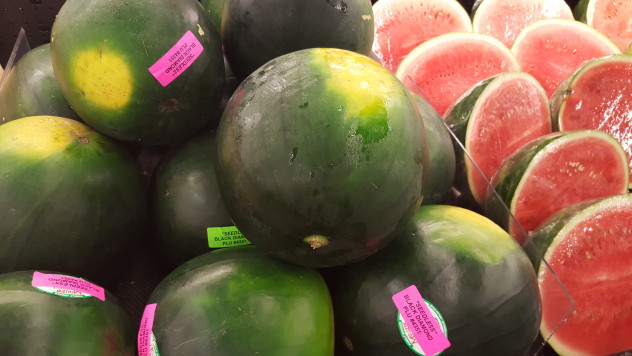
Americans for some mysterious reason are terrified of seeds in foods like olives, oranges, grapes, and watermelons; this seed-phobia is seeded in the Americans fixation on guarding their teeth. Growing seedless watermelon should be considered a larceny and an act of food abortions.
For thousands of years, watermelons have been the fruit of choice for most Egyptians to help them tolerate the brutal summer heat. Egyptians eat watermelons usually after meals as dessert, however for poor Egyptians combining watermelons with feta cheese, a contrasting flavor that provides them with a lovely meal. The watermelon seeds are often dried, baked, and flavored for light snacking. Watermelons provide Egyptian families with an opportunity for gathering and pastime entertainment. Watermelon is a communally food, you rarely see someone eating watermelon alone; as the Arab proverb says, you eat alone you die alone. As a youngster growing up in Egypt in a family of 10, I relished going out on the balcony on summer hot days with my brothers all shirtless and enjoying eating watermelons, holding a big slice with two hands, sticking our teeth into its rich crumbling body, and letting the red juice drip all over our faces and naked chests. This provided us with a much-needed cold sweet melon shower, and the fun didn't end there.
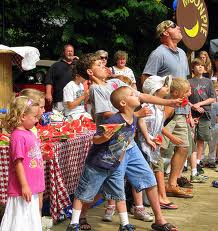 We then collected the black seeds in our mouths and started our spitting contest, deliberately and meticulously spitting them in the air to see who could land the furthest or perhaps hit the right targets. I got so good at this game, I could hit a fly standing on the wall across the street with a perfectly projected watermelon seed, a skill that I don't usually brag about or put on my résumé. The best place to have such sinful fun is at the beach in the summer. Since you are already half naked, you don't have to worry about the dripping mess; Egyptians women may refrain from getting wet swimming but they shower themselves with melon juice, besides, and you have all the sand and water you need to bury the green watermelon rinds and cover the evidence. Selling watermelon in Egypt is rich with tradition.
We then collected the black seeds in our mouths and started our spitting contest, deliberately and meticulously spitting them in the air to see who could land the furthest or perhaps hit the right targets. I got so good at this game, I could hit a fly standing on the wall across the street with a perfectly projected watermelon seed, a skill that I don't usually brag about or put on my résumé. The best place to have such sinful fun is at the beach in the summer. Since you are already half naked, you don't have to worry about the dripping mess; Egyptians women may refrain from getting wet swimming but they shower themselves with melon juice, besides, and you have all the sand and water you need to bury the green watermelon rinds and cover the evidence. Selling watermelon in Egypt is rich with tradition.
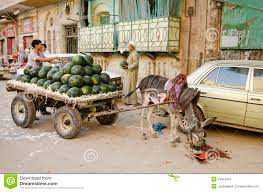
The street peddlers, their donkey carts loaded with big stacks of watermelons, will go around chanting their admiring jingles describing the beauty of their watermelons. 'Hamar we Halawah' reddish and sweetness, or Ya Gammr, ya Gamer; Oh Embers, like embers, and the confident watermelon peddler will chant Ala Elskinah Ya Helwah, challenging anyone to cut his watermelons and taste them on the spot before buying them, which it is the ultimate technique of picking up a good watermelon. From the tone of their voices you could tell which peddlers you could trust to have good watermelons. In Egypt most of bad watermelon seemed to be sold during Ramadan where people are fasting and are reluctant to perform ant taste testing.
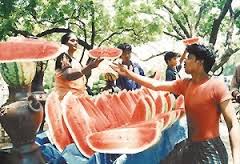
There is something intriguing about going through the experience of hunting a good watermelon in the market our modern battlefield; it is a form of art and mythology. Egyptians have very exaggerated appreciation of their ability to choose a good watermelon, and they will generously share them with anyone who will listen. Strangers in the street will stop and volunteer their watermelon selection techniques to you, which is a social behavior that is not welcome in other produce picking schemes like tomatoes or oranges. In picking a good watermelon, some people will treat their watermelon like pets; they will pat them, talk to them, others poke them and feel them, look for a big yellow spots on the bottom, or some will go to the extreme and carry them on their foreheads and listen to them. I actually saw a Middle Eastern looking man doing just that in the Minneapolis supermarket, but that was before the 9/11 era. Arab Americans nowadays will avoid any display of overly ethnic behavior in public; such listening to Arabic music in their cars or asking for halal meals on airplane flight. For me to pick up a good watermelon really is like picking a blind date; it is hit and miss at best, and you can do all the testing rituals you want and still get a bad melon. In fact, Americans consumed more than 368 billion pounds of watermelons last year, most of them are bad watermelons. It is very hard to grow a good watermelon; where 95% is water after all, so you only have 5% to get it right, such is life! .
Ahmed Tharwat
Freelance Writer
Producer and Host of the Arab American TV show BelAhdan on MN Public TV
Visit the Belahdan website.
www.ahmediatv.com
email ahmediatv@gmail.com

